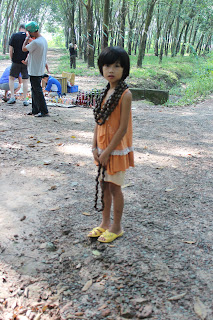This rubber plantation originally belonged to the French -- Michelin Tire, to be precise. Taken over by the state, now rubber production is a huge revenue producer for Vietnam. About a quarter of the 630,000 hectares in production are privately owned, 72% publicly owned; not sure about the balance. The value of rubber increases annually about $500 US per ton, according to Huy.
Trees are planted sequentially; we did pass some very small saplings in what looked like a private yard. They can be harvested until they are about 30 years old. Then the wood is harvested for furniture.
We got out of the bus and (like sticky rice) crossed over the road to take a closer look. Small diagonal cuts in the bark allows the sap to drain down, guided by the tape to a small trough of a spigot, where it drips into the bowl. The thin white liquid has the consistency of condensed milk, but as you rub it between your fingers, gradually becomes drier and somewhat the consistency of rubber cement. The sap is collected early in the morning.


There are few homes near rubber plantations, apparently (again according to Huy) because rubber trees are not healthy for humans. He said they "suck the oxygen from the air," and the life expectancy of people living near or within rubber plantations is five years shorter than that of other Vietnamese.
Not surprisingly, near where we stopped there were two vendors of trinkets for tourists. This sweet young girl had necklaces made of the seed of the rubber tree, and this man (her father? with a little puppy beside him) sold some beautiful wood carvings, as well as bracelets made of water buffalo horn (I couldn't resist!).





No comments:
Post a Comment